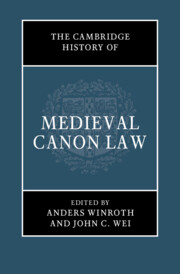Medieval canon law recognized detrusion (detrusio in monasterium) as a sentence for women convicted of adultery. Civil law had made adultery a capital crime, so that detrusio was a milder action. This article traces the history of detrusio in canon law, especially in the thirteenth century, and treats further questions that detrusio raised. Detrusio was originally a pastoral provision, meant to provide a woman rejected by her husband for adultery an opportunity to enter religious life. But in the hands of the jurists detrusio became a coercive ecclesiastical penalty for adultery. The practice raised further concerns, for example: how the woman's property was to be treated; whether the woman sentenced to detrusio became a religious; whether a monastery should be a site of confinement for the laity; and, under what conditions a husband could take his adulterous wife back. The case was also raised of a man who accused his wife of adultery so that he could dissolve his marriage and enter a monastery.
